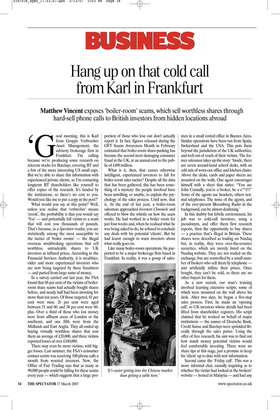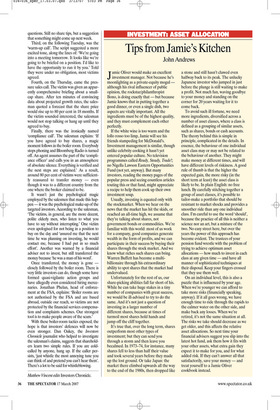Hang up on that cold call fromKarl in Frankfurt
Matthew Vincent exposes ‘boiler-room’ scams, which sell worthless shares through
hard-sell phone calls to British investors from hidden locations abroad
‘Good morning, this is Karl from Gruppe Verbrecher Asset Management, the advisory brokerage firm in Frankfurt. I’m calling because we’re producing some research on telecom stocks for Barclays, covering BT and a few of the more interesting US small caps. But we’re able to share this information with experienced private clients, so I’m contacting longterm BT shareholders like yourself to offer copies of the research. It’s funded by the institutions, so there’s no cost to you. Would you like me to put a copy in the post?’ What would you say at this point? Well, unless you realise that ‘verbrecher’ means ‘crook’, the probability is that you would say ‘Yes’ — and potentially fall victim to a scam that will cost you thousands of pounds. That’s because, as a Spectator reader, you are statistically among the most susceptible to the tactics of ‘boiler rooms’ — the illegal overseas stockbroking operations that sell worthless, untradeable shares to UK investors at inflated prices. According to the Financial Services Authority, it is wealthier, older and more experienced investors who are now being targeted by these fraudsters — and parted from large sums of money.
In a survey carried out last year, the FSA found that 88 per cent of the victims of boilerroom share scams had actually bought shares before, and nearly half had been investing for more than ten years. Of those targeted, 81 per cent were men, 26 per cent were aged between 51 and 60, and 38 per cent were 60plus. Over a third of those who lost money were from affluent areas of London or the southeast, and one fifth were from the Midlands and East Anglia. They all ended up buying virtually worthless shares that cost them an average of £20,000, and three victims reported losses of over £100,000.
There may even be more victims, with bigger losses. Last summer, the FSA’s consumer contact centre was receiving 100 phone calls a month from worried investors. Now, the Office of Fair Trading says that as many as 90,000 people could be falling for these scams every year — which suggests that a large pro portion of those who lose out don’t actually report it. In fact, figures released during the OFT Scams Awareness Month in February estimated that boiler-room share-pushing has become the second most damaging consumer fraud in the UK, at an annual cost to the public of £490 million.
What is it, then, that causes otherwise intelligent, experienced investors to fall for boiler-room sales tactics? Despite all the data that has been gathered, this has been something of a mystery: the people involved have been unwilling, or unable, to explain the psychology of the sales process. Until now, that is. At the end of last year, a boiler-room salesman approached Investors Chronicle and offered to blow the whistle on how the scam works. He had worked in a boiler room for just four weeks and, when he realised what he was being asked to do, he refused to conclude any deals with his potential ‘clients’. But he had learnt enough to warn investors about what really goes on.
Like many boiler-room operations, his purported to be a major brokerage firm based in Frankfurt. In reality, it was a group of sales men in a small rented office in Buenos Aires. Similar operations have been run from Spain, Switzerland and the USA. This puts them beyond the jurisdiction of the UK authorities, and well out of reach of their victims. The former salesman takes up the story: ‘Inside, there are seven second-hand school desks, with an odd mix of worn-out office and kitchen chairs. Above the desks, cards and paper sheets are mounted on the walls. One agent encourages himself with a sheet that states: “You are John Connally, you’re a broker, be a c**t!!!” Some of the agents use headsets, others normal telephones. The noise of the agents, and of the ever-present Bloomberg Radio in the background, can be almost deafening.’ In this shabby but febrile environment, his job was to cold-call investors, using a pseudonym, and offer them first research reports, then the opportunity to buy shares — a practice that’s illegal in Britain. These shares were described as trading on Nasdaq but, in reality, they were over-the-counter securities, which are merely listed on the Nasdaq website. They are not traded on the exchange, but are controlled by a small number of brokers who sell them by telephone and artificially inflate their prices. Once bought, they can’t be sold, as there are no other buyers for them.
As a new recruit, our man’s training involved learning extensive scripts, some of which were mounted on the wall above his desk. After two days, he began a five-step sales process. First, he made an ‘opening call’, to UK investors whose details had been lifted from shareholder registers. His script claimed that he worked on behalf of major institutions — the names of Deutsche Bank, Credit Suisse and Barclays were sprinkled liberally through the sales patter. Using the offer of free research, his aim was to find out how much money potential victims would feel comfortable investing. There were no share tips at this stage, just a promise to keep his ‘client’ up to date with new information.
Second came the ‘Friday call’. This was a more informal chat, casually inquiring as to whether the victim had looked at the brokers’ website — hosted in Malaysia — and had any questions. Still no share tips, but a suggestion that something might come up next week.
Third, on the following Tuesday, was the ‘warm-up call’. The script suggested a more excited tone, along the lines of: ‘We’re going into a meeting tomorrow. It looks like we’re going to be briefed on a position. I’d like to have the opportunity to run it by you.’ Told they were under no obligation, most victims agreed.
Fourth, on the Thursday, came the pressure sales call. The victim was given an apparently comprehensive briefing about a smallcap share. After ten minutes of convincing data about projected growth rates, the salesman quoted a forecast that the share price would rise up to 80 per cent in 18 months. If the victim sounded interested, the salesman would not stop talking or hang up until they agreed to buy.
Finally, there was the ironically named ‘compliance call’. The salesman explains: ‘If you have agreed to buy shares, a magic moment follows in the boiler room. Everybody stops phoning and Bloomberg Radio is turned off. An agent assumes the part of the ‘compliance officer’ and calls you in an atmosphere of absolute silence. Everything is verified and the next steps are explained.’ As a result, around 80 per cent of victims were sufficiently reassured to transfer money — even though it was to a different country from the one where the broker claimed to be.
It wasn’t just the psychological magic employed by the salesmen that made this happen — it was the psychological make-up of the targeted investors. According to the salesman, ‘The victims, in general, are the more decent, polite elderly men, who listen to what you have to say without interrupting.’ One victim even apologised for not being in a position to buy on the day and ‘assured me that the next time he was planning on investing, he would contact me, because I had put in so much effort’. Another was warned by a financial adviser not to invest, but still transferred the money because ‘he was a man of his word’.
Once transferred, the money is gone closely followed by the boiler room. There is very little investors can do, though some have formed quasi-vigilante action groups and have allegedly even considered hiring mercenaries. Jonathan Phelan, head of enforcement at the FSA, explains: ‘Boiler rooms are not authorised by the FSA and are based abroad, outside our reach, so victims are not protected by the financial services compensation and complaints schemes. Our strongest tool is to make people aware of the scam.’ With these boiler-room tactics exposed, the hope is that investors’ defences will now be even stronger. Dan Oakey, the Investors Chronicle journalist who helped to investigate the salesman’s claims, suggests that shareholders learn two simple rules. If you are coldcalled by anyone, hang up. If the caller persists, ‘just whistle the most annoying tune you can think of and pretend you can’t hear them’. There’s a lot to be said for whistleblowing.



































































































 Previous page
Previous page